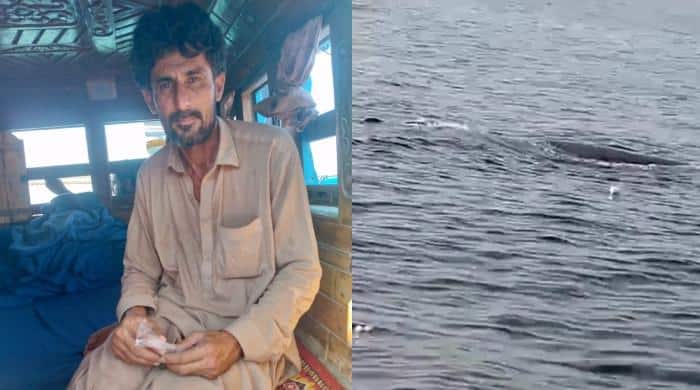A Pakistani fisherman single-handedly released a big sperm whale stuck in his fishing net while operating in the coastal waters near Ormara, Balochistan.
Scientifically known as Physeter microcephalus — sperm whale is one of the four big whales found in Pakistan.
The World Wildlife Fund for Nature (WWF) trained fisherman, Muhammad Shafiullah from Malakand, as a usual practice, laid down his gillnet and spotted a large whale entangled in the net the next morning (Saturday), while it was being heaved, the WWF said.
As per WWF-Pakistan Technical Adviser (Marine Fisheries) Muhammad Moazzam Khan, the occurrence was reported 16 kilometres south of Ormara headland, along the continental margin where the depth was 296 metres.
This area is a part of the recently declared Northeast Arabian Sea Important Marine Mammal Area, which is known for its rich diversity of whales and dolphins.
An official statement issued by the NGO said that it was a sub-surface gillnet introduced by WWF-Pakistan which provides passage to dolphins and small whales to cross without getting entangled.
However, the sperm whale was unable to bypass the gillnet as it was very large in size, with an estimated length of about 30 feet.
“Shaifullah first tried to retrieve the net, but it would have taken a very long time fearing it [whale] may get injured or die due to entanglement, Shaifullah rushed to the entangled whale and manoeuvered the net so the animal may escape but it failed,” it read.
The fisherman was finally able to cut about 500 metres of his net and release the whale after half an hour-long effort.
The WWF stated that even after being released, the sperm whale hovered around the boat for about 15 minutes and dived.
“The whale stayed near the boat after the release to thank us before disappearing it smiled (showing its both jaws and teeth) before diving,” Shafiullah said.
Speaking about the types of whales found in Pakistan, WWF official Khan said that apart from the sperm whale, there are three other species called the baleen whales, including blue whales, Arabian humpback whales, and Bryde’s whales.
Baleen whales filter water and eat the animals that are retained on their baleen, which is the series of fringed plates hanging in their mouths for straining seawater for food.
The sperm whales are considered to be the largest predator on the earth as they hunt mainly squid from the deep ocean between a depth of 300-500 metres. Their diet consists of giant squid, octopuses, and fish such as rays and sharks.
The sperm whales which are considered vulnerable according to the IUCN Red List were reported from Pakistan for the first time in 2007 when a skull was found near Sonara Beach, Karachi.
Later on, since 2017, WWF-Pakistan recorded a number of sightings of sperm whales in the coastal waters of the country, however, this is the first time that a large sperm whale was entangled in a fisherman’s net.
The need for protection of whales and dolphins is essentially required as almost all cetaceans (whales and dolphins) are considered to be endangered.
WWF-Pakistan introduction of subsurface gillnet in 2014 which was immediately adopted by the tuna fishermen of Pakistan led to the elimination of dolphin entanglement and in fishing nets. The present entanglement of sperm whales is the first such incident ever recorded in Pakistan.

